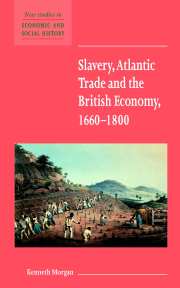Book contents
- Frontmatter
- Contents
- List of maps
- List of tables
- Acknowledgements
- Introduction
- 1 The context
- 2 The debates
- 3 The profits of the slave trade
- 4 Slavery, Atlantic trade and capital accumulation
- 5 British exports and transatlantic markets
- 6 Business institutions and the British economy
- 7 Atlantic trade and British ports
- Conclusion
- Bibliography
- Index
- Cambridge Cultural Social Studies
Conclusion
Published online by Cambridge University Press: 05 June 2012
- Frontmatter
- Contents
- List of maps
- List of tables
- Acknowledgements
- Introduction
- 1 The context
- 2 The debates
- 3 The profits of the slave trade
- 4 Slavery, Atlantic trade and capital accumulation
- 5 British exports and transatlantic markets
- 6 Business institutions and the British economy
- 7 Atlantic trade and British ports
- Conclusion
- Bibliography
- Index
- Cambridge Cultural Social Studies
Summary
Throughout this book the suggested links between the slave–sugar complex, Atlantic trade and the British economy have been delineated for the period 1660–1800, with particular reference to the issues raised in Eric Williams's Capitalism and Slavery, subsequent scholarship debating matters discussed therein and the various positions taken by historians looking at the interplay of home demand and foreign demand in British economic development. In the seventeenth and eighteenth centuries Britain had a thriving transatlantic trade, both on a bilateral and a multilateral basis, which grew over time. Receiving protection from privateers and the navy during frequent years of war, British trade coped with interruptions to normal shipping lanes probably better than its chief maritime rivals, the French. The pursuit of trade was aided by the revenues collected by the state that underpinned overseas expansion. Mercantilism, far from being a yoke that Britain needed to discard, proved a successful means of running a grand marine empire: shipping and trade, supported by naval strength, progressed over the long term despite temporary setbacks in times of commercial depression or war. Colonies were established in both North America and the West Indies, and trading posts maintained throughout the Atlantic trading world. The slave trade and slavery were central to the settler societies established in the New World and to the production of staple crops for European consumption.
- Type
- Chapter
- Information
- Publisher: Cambridge University PressPrint publication year: 2001



